Dental Implants Wethersfield
The Strongest, Longest-Lasting Tooth Replacement

Modern dentistry offers numerous treatments for replacing missing teeth. However, only one such treatment provides a comprehensive replacement of the entire tooth structure that can last for decades. Dental implants in Wethersfield may be the best way for you to reclaim your lost smile and get back to eating, speaking, and grinning with comfort and confidence. Drs. Brendan Dolan and Riley Gionfriddo are both dental implant experts and would be pleased to recommend a treatment plan that can restore your oral health and maybe even change your life! Contact our team at Dolan Dental Group today to get started.
Why Choose Dolan Dental Group for Dental Implants?
- Dental Implants Placed & Restored in One Convenient Location
- CBCT Scanner for Precise Dental Implant Treatment Planning
- Low-Interest Payment Plans Available
What are Dental Implants?

A dental implant is a cylinder-shaped titanium rod that is surgically inserted into the jawbone to mimic the root of a lost tooth. Due to titanium’s biocompatible nature, the implant post will actually fuse to the jawbone over the next few months. Essentially, the implant fools your body into thinking the natural tooth root is still there. Because of this, the implant could potentially remain in place for a lifetime.
After your jawbone has fully healed, we’ll place a metal fixture called an abutment on top of your implant. The abutment enables the implant to support a custom-made porcelain dental crown, completing your smile. Dental implants can also support a dental bridge or even a full denture, making them the perfect solution no matter how many teeth you’re missing!
The 4-Step Dental Implant Process

As the only tooth loss treatment to recreate both the root and the crown, dental implants allow you to enjoy a solution that has over a 95% success rate. Unlike other treatments, it requires a multi-step process that will take several months to complete. Don’t worry, it’s time well-spent to benefit from a prosthesis that can last for decades. Although everyone’s journey to a complete smile is different, here are the four basic steps of the dental implant process.
Initial Dental Implant Consultation

Generally, if you have good oral and general health, you’re a candidate for dental implants; however, you’ll need a consultation with your dentist in Wethersfield. Besides a visual examination, we will review your medical and lifestyle history, as well as take a CT scan to ensure dental implants are right for you. Based on the results of your examination, you may need additional procedures, such as tooth extractions, periodontal treatment, or bone grafting.
Dental Implant Surgery

After you’ve healed from any previous treatments, you’re scheduled for your placement surgery. As a member of the Academy of Osseointegration, Dr. Brendan Dolan has undergone the training necessary to place dental implants right here in our office.
Sedation or anesthesia is used to ensure your comfort as your gum tissue is opened to gain access to your jaw. A small hole is made into a pre-determined location to insert your implant post. Your gum tissue is sutured closed, allowing you to begin the healing process.
Dental Implant Osseointegration/Abutment

The implant post acts as a new tooth root, stimulating your jaw to promote bone growth. Over the next several months, your jawbone will fuse to the post, allowing it to potentially remain in place forever. It also provides a stable foundation for your new tooth.
After your jawbone has healed, you’ll need a second minor surgery to place an abutment on the post. The special fixture connects your restoration to the dental implant. Your gum is opened to expose the implant so the abutment can be attached. Your tissue will heal around it over the course of roughly two weeks.
Delivery of Dental Implant Restoration(s)

While your gum tissue is healing, the dental lab is carefully crafting your restoration from all-ceramic material. It’s made to match the exact color, size, and shape of your natural teeth to blend in when you smile. Your restoration is made of durable material to withstand the pressure of regular chewing, allowing it to last for many years with the right care.
Benefits of Dental Implants

If you are missing one or more teeth, dental implants may be the ideal treatment for you. They offer remarkable benefits that other forms of tooth replacement, such as traditional bridges and dentures, simply cannot deliver. The way they’re made, their durability and functionality, and their ability to last a lifetime are just a few of the many reasons they are considered the most superior form of tooth replacement available. More than 3 million people are living with dental implants, and nearly 500,000 are placed each year! If you are ready to learn more about the benefits of dental implants in Wethersfield, spend a few moments reviewing the following information to discover why they’re the best way to rebuild a smile.
Day-to-Day Benefits

- A dental implant is a prosthetic tooth root that gets placed beneath the gum line. Artificial teeth go on top of implants to replace the visible portion of lost teeth. Other treatments only replace this visible portion. Because dental implants mimic the structure of natural teeth, they are extremely sturdy and feel natural in the mouth. They also look quite lifelike. In fact, it is unlikely that onlookers will have any idea that your teeth are not the same ones you have had since your youth.
- Traditional dentures come with many dietary restrictions and require you to take certain precautions when you eat. Dental implants function like natural teeth and can stand up to virtually any food, from juicy steaks to crisp vegetables and everything in between.
- Dentures can make it difficult to feel comfortable around others. In fact, 34% of denture-wearers claim they have trouble living life to the fullest because of their prosthesis. Dental implants in Wethersfield offer a chance to enjoy time spent with family and friends. Giving you the greater confidence that you deserve, you can freely eat, smile, and speak without worry or embarrassment.
- Instead of spending more time soaking your dentures, you can easily maintain your dental implants with regular brushing, flossing, and rinsing. This allows for greater oral hygiene habits and a reduced risk of gum disease and tooth decay.
Health Benefits
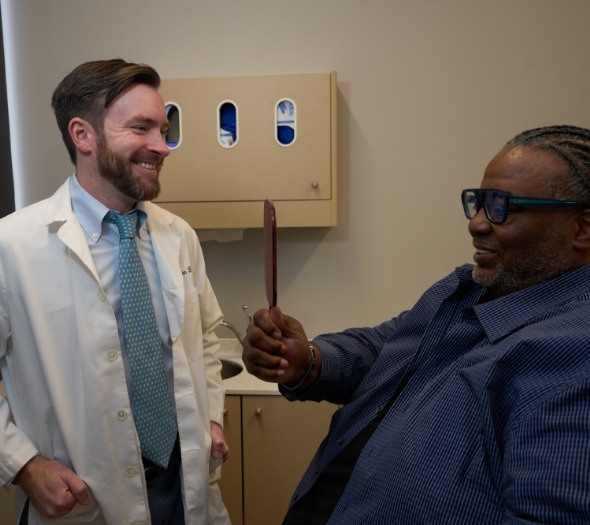
- If you want to lower your chances of developing common health problems (i.e., diabetes, cardiovascular disease, osteoporosis) that could potentially shorten your lifespan, dental implants can help. It is believed individuals over the age of 65 with five or more missing teeth are at a greater risk for health issues. Replacing your missing teeth with implants can help extend your lifespan and avoid the struggles and complications brought on by various systemic diseases.
- Dental implants can help to protect your natural teeth by preventing dental drift that can cause a misaligned bite. They also make it possible to keep more of your natural tooth structure because your healthy teeth will not be used as anchors for your implants (which they would if you were receiving a dental bridge).
- Tooth loss is known to cause jawbone deterioration, but dental implants can prevent this by stimulating the bone once it fuses, allowing you to enjoy a fuller, more youthful appearance.
Long-Term Benefits

- With proper care, dental implants have the potential to last a lifetime.
- Dental implants are the most cost-effective form of tooth replacement. Even though they have a higher upfront price than dentures or bridges, it’s worth noting that non-implant prostheses usually need to be replaced every 5-10 years and require special cleaning solutions and dental adhesives; over time, this can be quite expensive. Dental implants, on the other hand, last so long that their price is more than worth it in the long run.
- The success rate for initial placement by a qualified implant dentist in Wethersfield is 98%. After 10 years, it only falls to 90-95%.
Who Dental Implants Can Help
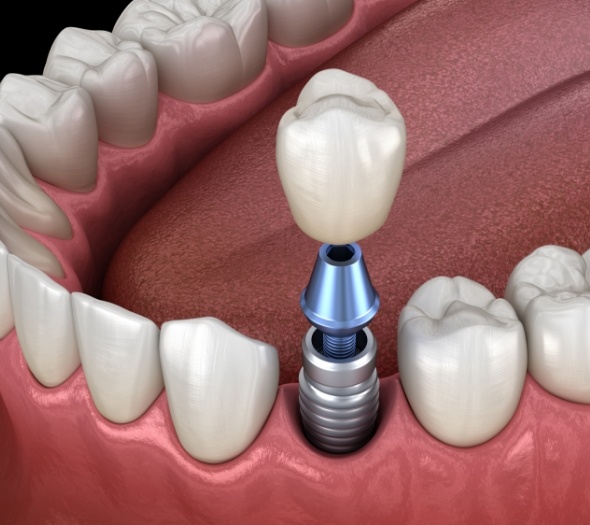
Dental implants may be an appropriate treatment for you whether you are missing one tooth, several teeth, or even all of your teeth.
Missing One Tooth

If you need to have just one tooth replaced, your dentist in Wethersfield may recommend that you receive a single dental implant. A crown will replace the visible portion of your missing tooth.
Missing Multiple Teeth
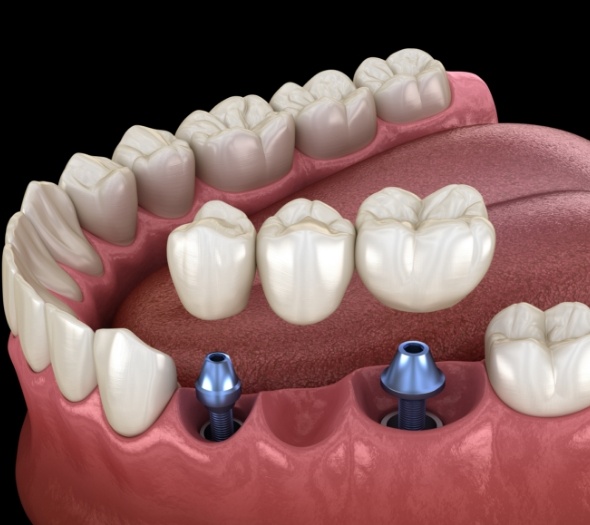
If you are missing several teeth in a row, an implant-supported dental bridge may be the best treatment for you. You may be able to replace three, four, or more teeth with just two implants and a single prosthesis.
Missing All Teeth
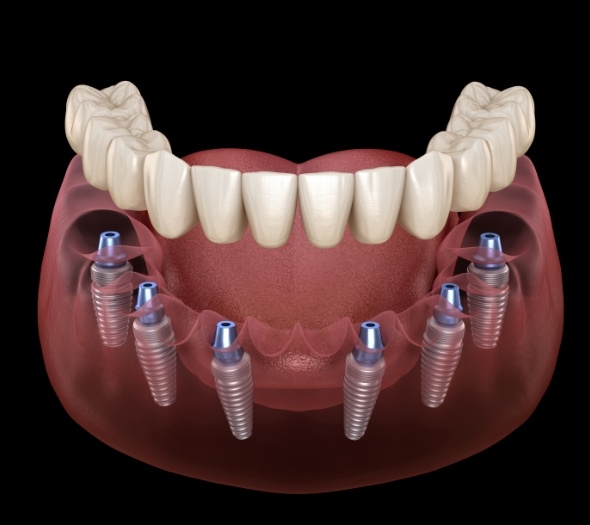
An implant denture is often the ideal solution for patients who have lost all or most of their teeth. It usually takes between four and six implants to provide the needed support for a full denture. This type of prosthesis may either be removable or permanently fixed in place.
Understanding the Cost of Dental Implants
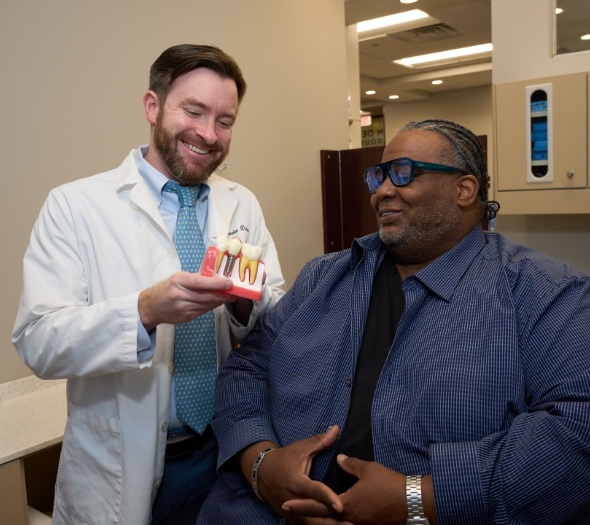
Since every patient’s circumstances are unique, it’s difficult to provide a ballpark estimate of how much your restored smile will cost. Various factors, such as the number of implants needed, the extent of any preliminary work, and the nature of the implant-retained prosthesis, contribute to the total cost of dental implants in Wethersfield.
Although dental implants may seem expensive, they are a worthwhile investment! The long-term benefits they offer for your appearance and oral health make them an excellent value. Also, our team will do our best to maximize your dental insurance benefits, provide flexible financing options, and work to make your treatment as affordable as possible. To learn more about this amazing treatment, contact Dolan Dental Group today.
Preliminary Treatments & Dental Implant Surgery
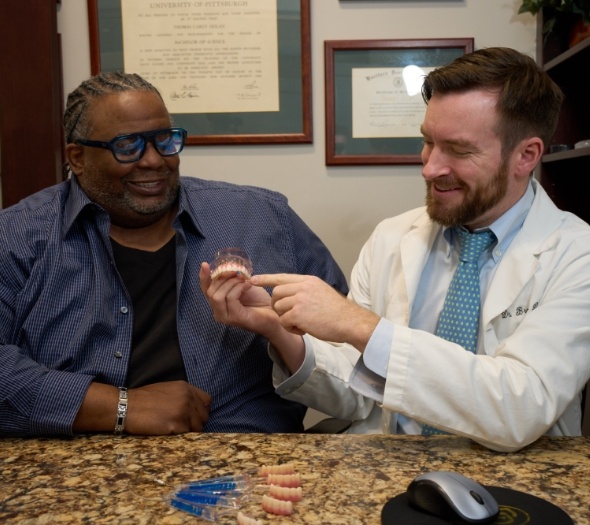
Preliminary treatments may be necessary to help improve the integrity and structure of your smile. Bone grafting, periodontal treatment, and tooth extractions will add to the overall cost of your treatment; however, most dental insurance companies will agree to provide coverage for many of these procedures.
Aside from any preliminary treatments you might need, the actual implant surgery does incur its own cost. This includes not only the placement of your implants but also the anesthesia or sedation you will need. Fortunately, the entire procedure is completed in-house by our team of experts, which means you will avoid having to pay an outside specialist for the actual surgery.
The Parts of Your Dental Implant
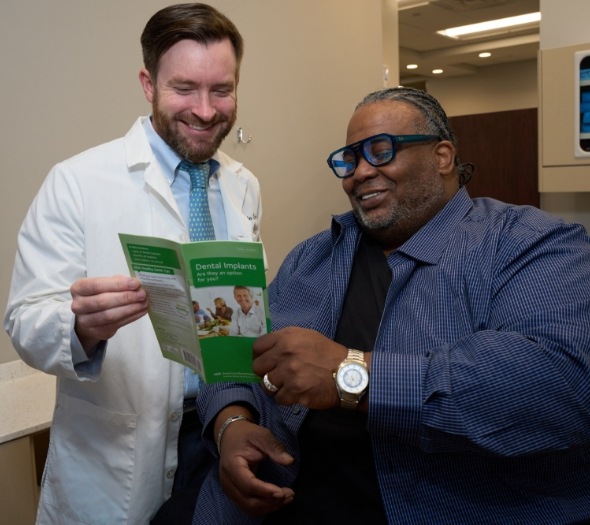
The size, shape, material, length, texture, and other components of your dental implants can add to the total cost of your new smile. Some factors you may not have considered include:
- The number of dental implants you will need – One single dental implant will naturally cost much less than having 4-6 implants placed along your jawbone. However, an implant denture will be more cost-effective than having individual implants replace each missing tooth.
- The type of restoration you will need – Dental implants are versatile, so we will determine if you need a crown, bridge, or denture, each of which incurs its own cost.
- Size or material of your implants – Dental implants can be made of titanium or zirconia. Also, you might require shorter implants because of their placement within the jawbone. These factors can determine if you will pay more or less for your new smile.
- Brand of the implant – Similar to a car, there are different brands and manufacturers for dental implants. Based on your individual needs, we may choose a particular brand over another to ensure you have a successful placement.
When it comes to better understanding the cost associated with your actual dental implants in Wethersfield, do not be afraid to ask. We will go over the information with you so you are fully aware of the type of implant you will receive and why.
How Dental Implants Can Save You Money

It is not uncommon to initially believe that traditional dentures or fixed bridges will save you money in the long run. After all, they are more affordable in the beginning. However, the more expensive investment you’ll make by choosing dental implants will actually ultimately be more cost-effective.
How? You’ll save money by not requiring replacements or adjustments every 5-10 years, you will not need to purchase special dental adhesives to keep your prosthesis in place, and you will not require additional cleaning solutions to maintain your new teeth.
Also, you will find that your dental implants will not irritate or wear down your teeth and gums like dentures or dental bridges. They’re much easier to keep clean, which will, in turn, reduce your risk for tooth decay, gum disease, and jawbone deterioration. If you want to lower your risk of systemic diseases and reduce your costs to address them, dental implants will certainly help you maintain better oral and overall health.
Does My Dental Insurance Cover Dental Implants?

Unfortunately, most dental insurance companies do not provide coverage for implant placement; however, there are a few exceptions to the rule. When meeting with your implant dentist in Wethersfield, we will go over the details of your plan and help you determine if it’s possible to maximize your benefits in any way. If portions of your treatment can be covered with your insurance policy, we will work on your behalf to file the necessary paperwork and claims.
Making Dental Implants Affordable
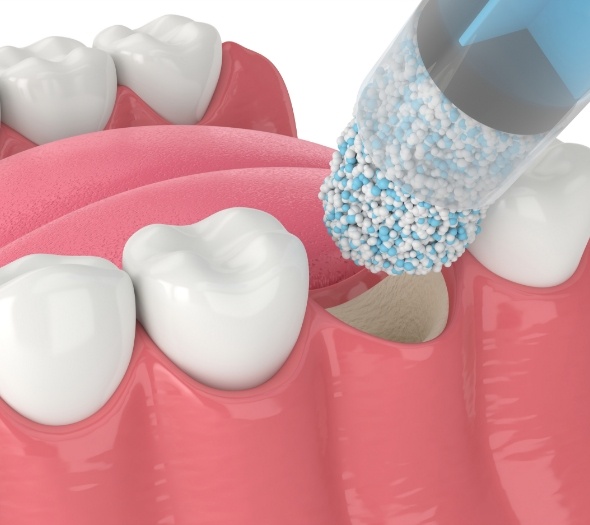
If you are uninsured or require additional financial assistance to pay any remaining balance, the team at Dolan Dental Group will work to help you enroll in flexible financing through CareCredit. This third-party company offers low and no-interest solutions to help you break up the cost of your treatment into manageable monthly payments. This will allow you to move forward with treatment while staying well within your budget.
Advanced Dental Implant Procedures
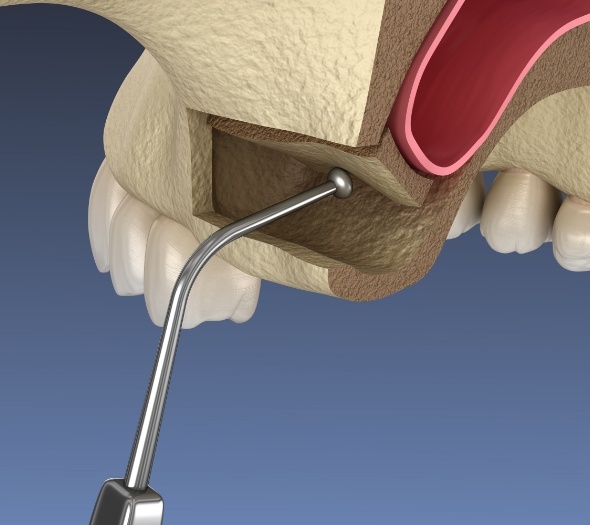
After your initial consultation, your CT scan may show you’re not a candidate for dental implants because of bone loss. Don’t worry; you may still be able to benefit from them, but you’ll need an additional procedure to ensure your new smile has the foundation it needs to thrive. Bone grafting and a sinus lift will ensure you have enough bone to support your dental implants long-term.
Bone Grafting
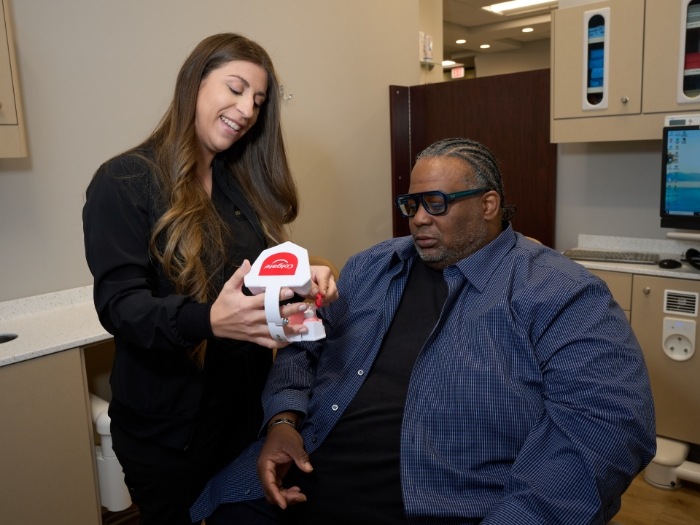
Jawbone loss is a common complication of a missing tooth because you’re not just losing the crown; you also lose the root. As a result, your jawbone isn’t being stimulated, so it slowly shrinks. If you lose too much bone, your jaw can’t support the dental implant, ultimately leading to failure.
Bone grafting can repair areas with low bone density to ensure your jaw properly fuses to the post to support it for many years with the right aftercare. Bone is taken from another area of your body or a donor and grafted to your jaw using a minor surgical procedure.
Over the next several weeks, the graft will integrate with your jaw to enhance its strength. After you’ve fully healed, you’ll be ready to undergo your placement surgery to insert a titanium post into your jawbone to serve as a new root.
Sinus Lift
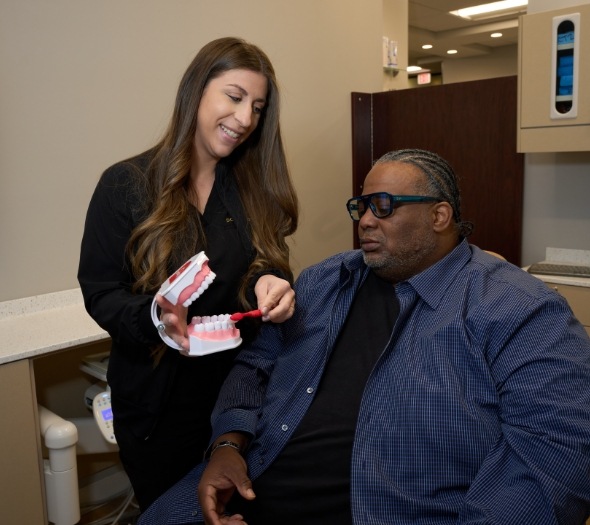
Also called a sinus augmentation, the procedure adds more bone between the upper jaw and your maxillary sinuses, which are located on either side of your nose. This is often necessary for patients who have lost their molars. It’s common for a patient to need both a sinus lift and bone grafting.
Your oral surgeon will open your gum tissue to cut a small oval into your jawbone. Your sinus will be lifted upward, and a grafting material will be inserted into the hole. Your body will accept the graft and seal the hole to create the sturdy framework you need for dental implants.
Dental Implants Post-Op Instructions
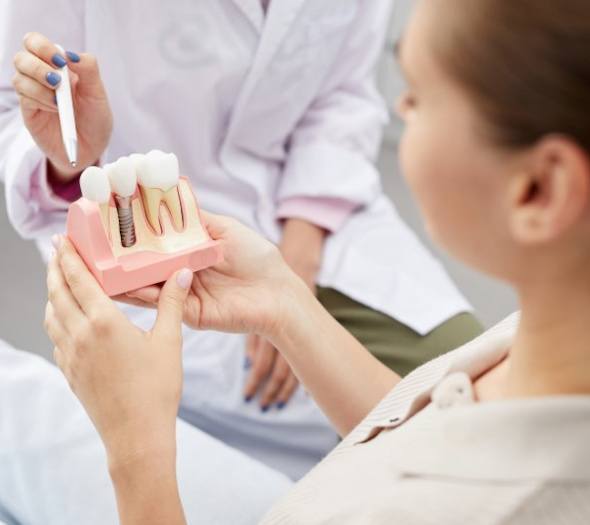
After you’ve undergone your dental implant procedure and finally received your titanium posts, you’ll need to focus on your healing process to ensure your treatment is successful. Before and after your surgery, our team will provide you with specific guidelines on how to optimize your recovery so that you can return to oral health as soon as possible. Until then, here are some of the main things to consider during your post-op healing period.
What to Do Directly After Dental Implant Surgery

Right after receiving your dental implants, you’ll need to make sure that the blood clot forming around the surgical site isn’t disturbed. Other than getting plenty of rest, be sure to practice the following tips:
- Keep your head elevated when resting to avoid blood rushing to the head
- Avoid touching the area with your tongue or fingers
- Refrain from smoking right after your appointment
- Do NOT spit; use a tissue or swallow your saliva instead
- Stay away from using straws, as the suction can disturb the implant site
Common Side Effects When Recovering from Dental Implant Placement

It’s quite normal to experience some mild symptoms after undergoing dental implant surgery, especially for the first several days. Here’s what you might expect during your recovery and how to manage the situation:
- Discomfort: You’ll likely be sore after your procedure. This can be addressed simply with over-the-counter or prescribed pain medication.
- Swelling: Your gums or cheeks can become inflamed for the first three days after the surgery. This can be avoided or minimized by using a cold compress.
- Bleeding: You might experience mild bleeding for the first few days, which can easily be treated with clean gauze and light pressure to the area.
Your Diet After Dental Implant Surgery

Since you won’t want to interrupt the healing process, your diet will need to consist of softer foods that won’t require excessive chewing. Some of your dietary options during your recovery should include:
- Mashed potatoes
- Yogurt
- Applesauce
- Warm or cold soup
- Ice cream
- Scrambled eggs
- Pudding
Post-Op Health & Oral Hygiene

Normally, you should be able to start brushing your teeth like normal the day after your procedure. Just be sure to avoid the surgical site to not disturb the blood clot. When rinsing your mouth, use salt water and avoid spitting it out. Instead, let it pour from your mouth to the sink so that no pressure or suction disrupts the area. Also, avoid using mouthwash that contains alcohol, as this can be quite uncomfortable.
What to Do After Your New Teeth Are Attached

Once you receive your new pearly whites, you’ll be free to make the most of your fully rebuilt smile. There might still be some slight sensitivity immediately after receiving your new restoration or prosthetic, but this should fade over a short amount of time. If you notice any complications or issues with your dental implants, be sure to notify our team so that we can address the situation straight away.
Maintaining & Caring for Your Dental Implants
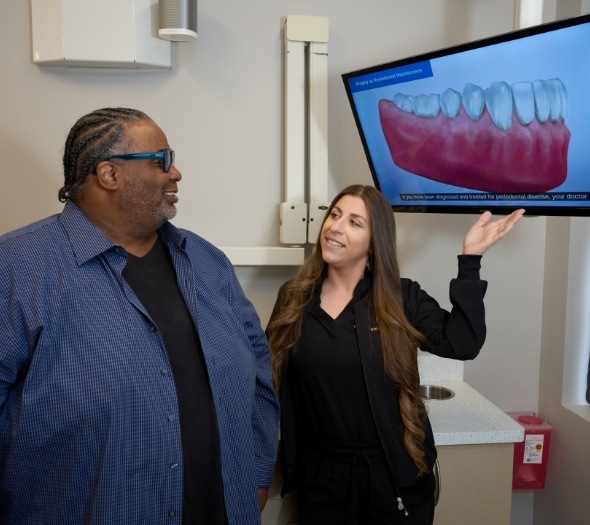
As the strongest, longest-lasting tooth replacement currently available, dental implants can potentially remain in your mouth for the rest of your life – if you properly maintain them, that is. The good news is that taking care of dental implants isn’t very different from caring for natural teeth. Our team at Dolan Dental Group is always happy to answer any questions you may have about dental implant care in Wethersfield. Below are the five most important steps you can take to get the most out of your new pearly whites!
Make Oral Hygiene a Priority
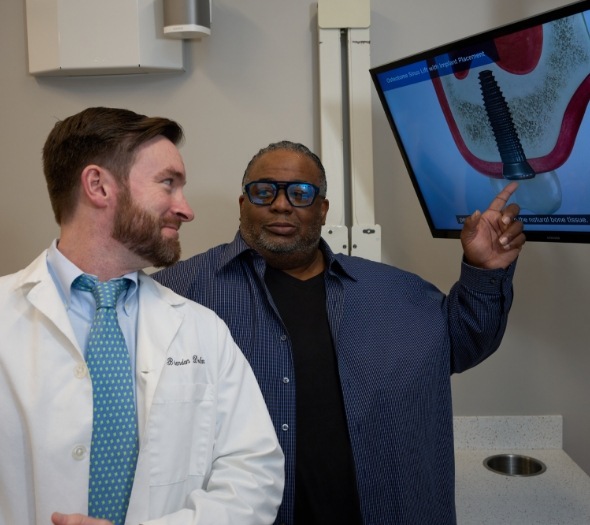
Dental implants aren’t vulnerable to decay, but they can fail without proper oral hygiene. Plaque buildup in the gums can cause bacteria to destroy the supportive tissues and break the bond between the posts and the jawbone. On top of that, any natural teeth you still have can develop cavities.
On the bright side, dental implants in Wethersfield don’t require a complex daily care routine like dentures do. In most cases, you can clean them like natural teeth by brushing twice a day for two minutes each session and flossing at least once per day.
Eat a Healthy Diet
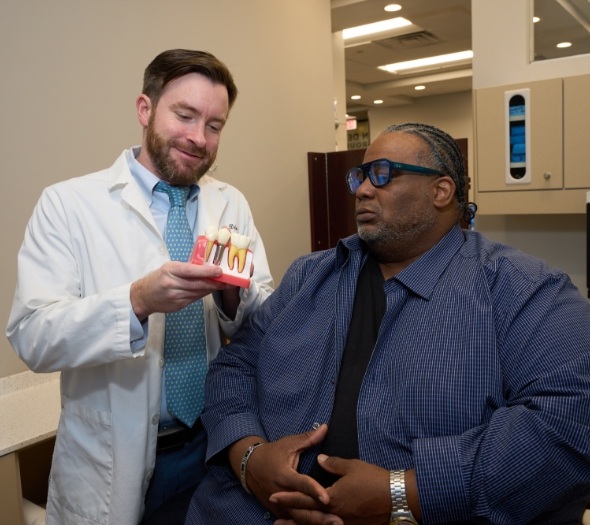
Foods that benefit your overall health are generally also great for your dental implants. Incorporate plenty of fresh fruits, vegetables, and calcium-rich dairy products into your diet to give your gums and jawbone the nutrients they need to provide strong support for your implants. Try to eat starchy and sugary foods in moderation; they’re not harmful every now and then, but overconsumption can increase the growth of harmful bacteria in the mouth.
Break Bad Habits
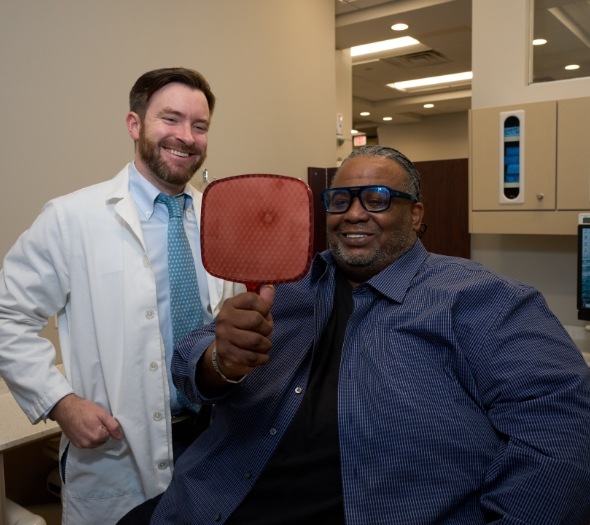
Just as eating ice, biting on pencils, and chewing your fingernails can damage natural teeth, they can also take a serious toll on your implants. Making an effort to quit these habits will pay off by ensuring your implants last much longer. If you’re having trouble, try substituting such habits for better ones. For example, whenever the urge to bite your nails strikes you, chew on a piece of sugar-free gum instead.
Protect Your Dental Implants
Many people are prone to nighttime teeth grinding, also known as bruxism. Without treatment, the pressure could wear down your implants and remaining teeth over time. That’s why your implant dentist in Wethersfield recommends wearing a custom nightguard to protect against bruxism-related damage. Of course, you should also wear an athletic mouthguard if you play any sports that carry the risk of getting hit in the face. A mouthguard will minimize injury by absorbing much of the impact.
Schedule Regular Dental Checkups
Even with dental implants, you should still visit our office for two checkups a year. With routine exams, our team will be able to catch small issues with your implants, natural teeth, or gums and treat them in their early stages. This can save you from the major headaches that come with waiting until your mouth starts hurting to seek care. It may even allow us to save dental implants that would otherwise fail!
Dental Implant FAQs
Can I get dental implants if I have gum disease?
Although gum disease is preventable, it’s the leading cause of tooth loss. If you’ve lost one or more teeth from gum disease, you will not be a candidate for dental implants if the infection is still active. You can create the healthy foundation your new smile needs with periodontal treatment. We’ll stop the infection to make you a candidate for the procedure. After your smile is complete, it’s essential you maintain your oral hygiene and visit your dentist regularly to prevent the infection from reoccurring.
Will I need bone grafting before getting dental implants?
Dental implants and bone grafting often go together; however, not everyone needs the extra step in their treatment plan. Your dentist in Wethersfield will review a CT scan of your mouth to evaluate the density of your jawbone. If you’ve experienced bone loss, such as from untreated missing teeth, you might need the additional procedure. Although it adds another step to your treatment plan, it creates the stable groundwork dental implants need to integrate with your jawbone. This allows them to support your restoration for many years to come with the right aftercare.
Can dental implants fail?
Dental implants are the most reliable option to treat tooth loss with over a 95% success rate. Although it’s rare, they can fail, but the risk is generally less than 5%. Most often, dental implants fail because of a preventable infection called peri-implantitis. It’s similar to gum disease because it’s caused by bacteria found in plaque and tartar buildup. You can significantly reduce your risk of infection by brushing and flossing your teeth correctly at home and visiting our office at least twice a year for a cleaning and checkup. If you develop any concerning signs in between your routine visits, like pain or inflamed gum tissue, don’t wait to contact our office. Early intervention can help to prevent complete dental implant failure.
Can I use my dental insurance to pay for dental implants?
Every policy differs, but many insurance carriers will cover a portion of the cost of dental implants after paying your yearly deductible. You can use your annual allowance to lower the amount you need to pay out-of-pocket for certain steps in your care, like periodontal treatment, X-rays, or the final restoration. We will work on your behalf with your insurance carrier to file the necessary claims and forms to reduce the amount you pay. A member of our team will explain how your benefits are being used and if you owe a remaining balance.
